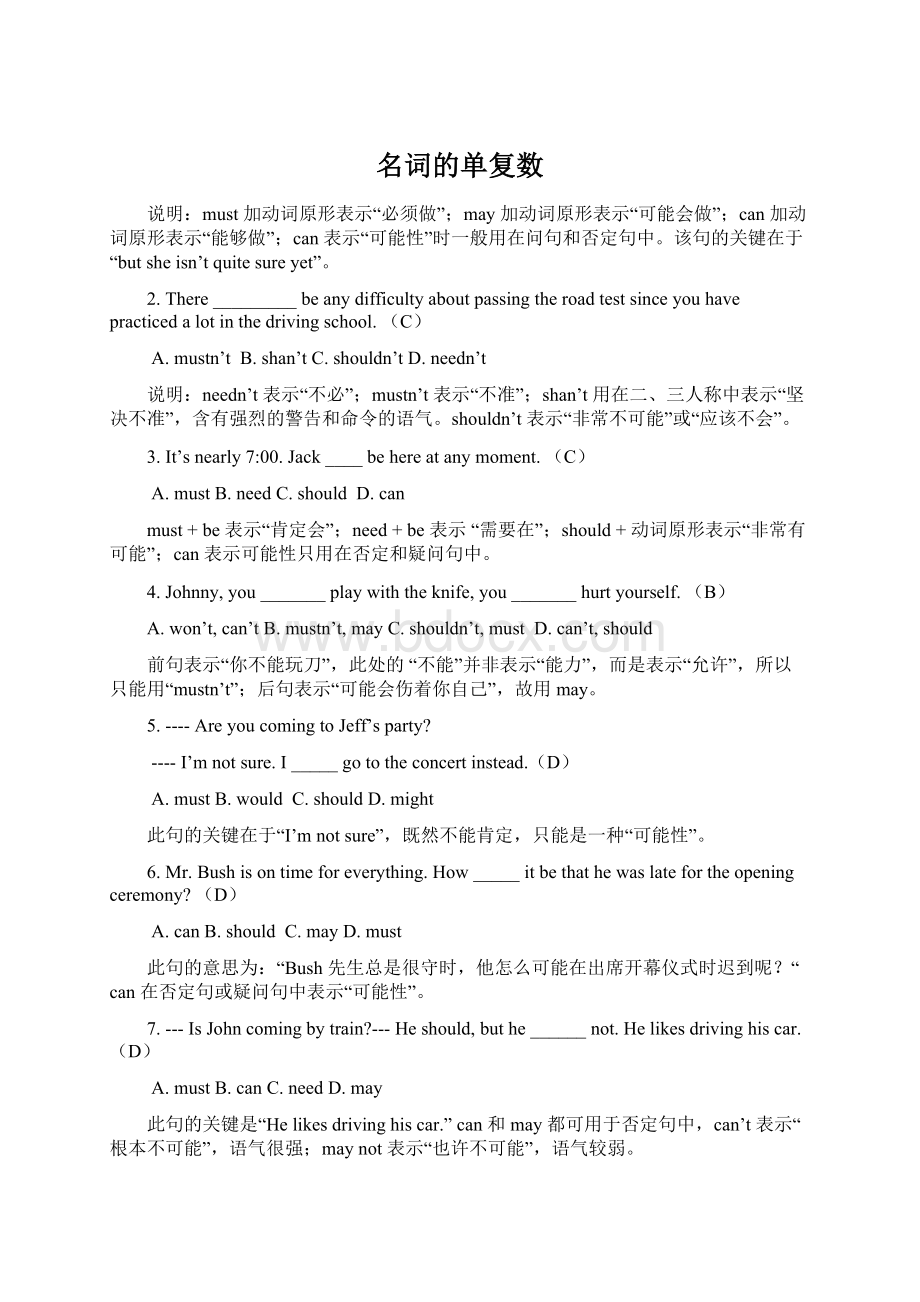名词的单复数.docx
《名词的单复数.docx》由会员分享,可在线阅读,更多相关《名词的单复数.docx(37页珍藏版)》请在冰豆网上搜索。

名词的单复数
说明:
must加动词原形表示“必须做”;may加动词原形表示“可能会做”;can加动词原形表示“能够做”;can表示“可能性”时一般用在问句和否定句中。
该句的关键在于“butsheisn’tquitesureyet”。
2.There_________beanydifficultyaboutpassingtheroadtestsinceyouhavepracticedalotinthedrivingschool.(C)
A.mustn’tB.shan’tC.shouldn’tD.needn’t
说明:
needn’t表示“不必”;mustn’t表示“不准”;shan’t用在二、三人称中表示“坚决不准”,含有强烈的警告和命令的语气。
shouldn’t表示“非常不可能”或“应该不会”。
3.It’snearly7:
00.Jack____behereatanymoment.(C)
A.mustB.needC.shouldD.can
must+be表示“肯定会”;need+be表示“需要在”;should+动词原形表示“非常有可能”;can表示可能性只用在否定和疑问句中。
4.Johnny,you_______playwiththeknife,you_______hurtyourself.(B)
A.won’t,can’tB.mustn’t,mayC.shouldn’t,mustD.can’t,should
前句表示“你不能玩刀”,此处的“不能”并非表示“能力”,而是表示“允许”,所以只能用“mustn’t”;后句表示“可能会伤着你自己”,故用may。
5.----AreyoucomingtoJeff’sparty?
----I’mnotsure.I_____gototheconcertinstead.(D)
A.mustB.wouldC.shouldD.might
此句的关键在于“I’mnotsure”,既然不能肯定,只能是一种“可能性”。
6.Mr.Bushisontimeforeverything.How_____itbethathewaslatefortheopeningceremony?
(D)
A.canB.shouldC.mayD.must
此句的意思为:
“Bush先生总是很守时,他怎么可能在出席开幕仪式时迟到呢?
“can在否定句或疑问句中表示“可能性”。
7.---IsJohncomingbytrain?
---Heshould,buthe______not.Helikesdrivinghiscar.(D)
A.mustB.canC.needD.may
此句的关键是“Helikesdrivinghiscar.”can和may都可用于否定句中,can’t表示“根本不可能”,语气很强;maynot表示“也许不可能”,语气较弱。
8.---Iheardtheywentskiinginthemountainslastwinter.
---It_________truebecausetherewaslittlesnowthere.(C)
A.maynotbeB.won’tbeC.couldn’tbeD.mustn’tbe
couldn’t的语气比can’t弱。
B.对过去动作或状态的推测
1.Tomoughtnotto_______meyoursecret,buthemeantnoharm(A)
A.havetoldB.tellC.betellingD.havingtold
oughtto相当于should;此句的关键是“Hemeantnoharm”,显然指的是过去的事。
2.ItoldSallyhowtogethere,butperhapsI_______forher.(C)
A.hadtowriteitoutB.musthavewrittenitout
C.shouldhavewrittenitoutD.oughttowriteitout
shouldhavewritten意指“本该写但实际上并没有写”。
3.---Therewerealready5peopleinthecarbuttheymanagedtotakemeaswell.
---It________acomfortablejourney.(D)
A.can’tbeB.shouldn’tbeC.mustn’thavebeenD.couldn’thavebeen
此句谈论的是过去的经历,故A、B不合题意;must表示判断和推测只能用在肯定句中。
4.Susan_______writtenareportlikethis.(C)
A.canhaveB.mustn’thaveC.can’thaveD.oughttonothave
该句的意思为Susan不可能写出这样的报告来。
oughttohavedone的否定式为oughtnottohavedone。
5.Jack____yet,otherwisehewouldhavephonedme.(C)
A.mustn’thavearrivedB.shouldn’thavearrived
C.can’thavearrivedD.needn’thavearrived
此句的关键是后半句,“otherwisehewouldhavephonedme”,此处为省略了条件句的虚拟语气,表示“如果到了他会打电话给我的”,由此可见,他肯定没到。
6.---IstayedatahotelwhileinNewYork.
---Oh,didyou?
You______withBarbara.(A)
A.couldhavestayedB.couldstay
C.wouldstayD.musthavestayed
此句并不表示判断,而是一个虚拟语气。
4.shall;should的特殊用法
1.Ithasbeenannouncedthatcandidates____remainintheirseatsuntilallthepapershavebeencollected.(D)
A.canB.willC.mayD.shall
该句的意思为:
“通知说所有的考生必须坐在位置上直到考卷收完了才能离开。
”考生坐在位置上不能用“能够、将要、可以”来表示。
而shall在第二、三人称里面表示一种“命令、警告、承诺”等。
2.It’snearly7:
00.Jack_____behereatanymoment.(C)
A.mustB.needC.shouldD.can
3.---WhencanIcomeforthephotos?
Ineedthemtomorrowafternoon.
---They__________bereadyby12:
00.(B)
A.canB.shouldC.mightD.need
此句应是店主对顾客的承诺。
4.Youcan’timaginethatawell-behavedgentleman_____besorudetoalady.(C)
A.mightB.needC.shouldD.would
should与how;why等表示疑问或否定的词连用时,用来表示一种惊奇的心情,意思为“居然、竟然”
5.情态动词的应答
1.---ShallItellJohnaboutit?
---No,you______.I’vetoldhimalready.(A)
A.needn’tB.wouldn’tC.mustn’tD.shouldn’t
此句的关键是“I’vetoldhimalready”,由此可见,你就不必再对他说了。
2.---CouldIcallyoubythefirstname?
---Yes,you__________.(C)
A.willB.couldC.mayD.might
在回答“CouldI…”这类婉客气的请求时,只能回答“Yes,youcan或may”。
不能用could或might。
3.---Willyoustayforlunch?
---Sorry,_____.Mybrotheriscomingtoseeme.(B)
A.Imustn’tB.Ican’tC.Ineedn’tD.Iwon’t
此句的关键是“Mybrotheriscomingtoseeme.”所以我不能在这儿吃饭。
4.----Writetomewhenyougethome.
----__________.(C)
A.ImustB.IshouldC.IwillD.Ican
在回答对方的请求或命令时,应该用“Yes,Iwill.”而不能使用would或should。
6.情态动词的其它一些用法
1.Iwonderhowhe_______thattotheteacher.(D)
A.daretosayB.daresayingC.notdaresayD.daredsay
注意比较dare和need的两种词性的不同用法。
2.Thefirespreadthroughthehotelveryquicklybuteveryone______getout.(C)
A.hadtoB.wouldC.wasabletoD.could
注意比较could与wasableto的用法区别。
3.Whenhewasthere,he_______gotothatcoffeeshopatthecornerafterworkeveryday.(A)
A.wouldB.shouldC.hadbetterD.might
would在此处表示过去惯常的动作。
虚拟语气
1.虚拟语气的考点
1、条件句中的虚拟语气的用法;
2、条件句中虚拟语气的倒装;
3、名词性从句中虚拟语气的用法;
4、几种特殊结构中虚拟语气的用法;
5、虚拟语气与陈述语气的判定。
1、陈述语气与虚拟语气
1)Thevolleyballmatchwillbeputoffifit_____. (B)
A. willrain B.rains C.rained D.israined
该句为陈述语气,因为主句用的是willbeputoff。
真实条件句主句为将来时,从句用一般现在时代将来时。
2)---Wouldyouhavecalledherup_____possible?
---Yes,butI_____busydoingmyhomework.(A)
A.haditbeen…wasB.ifitwas…were
C.ifithadbeen…hadbeenD.ifitwere…wouldbe
问句中用的是虚拟语气,主句用wouldhavecalled,从句中与过去相反的动词形式为haddone;答句中表示的是真实的情况,所以该用陈述语气。
2、条件句中的虚拟语气
时间
If条件句
主句
过去
haddone
wouldhavedone
现在
did/were
woulddo
将来
shoulddo
weretodo
did/were
woulddo
1)Youdidn’tletmedrive.Ifwe____inturn,you____sotired.(B)
A.drove…didn’tgetB.haddriven…wouldn’thavegot
C.drove…wouldn’tgetD.weredriving…wouldn’tget
前句用的是陈述语气,表示过去发生的事;后句是虚拟语气,表示与过去相反。
2)ItishardformetoimaginewhatIwouldbedoingtodayifI_____inlove,attheageofseven,withtheMelindaCoxLibraryinmyhometown. (B)
A.wouldn’thavefallenB.hadnotfallenC.shouldfallD.weretofall
该句主句中用的是与现在相反的虚拟语气,而从句中使用的是与过去相反的虚拟语气。
全句意思为“如果我不在七岁时迷上了我们家乡的MelindaCoxLibrary,我真不能想象我今天会做什么。
”
3、条件句中虚拟语气的特殊情况
1)虚拟倒装句
Whatwouldhavehappened,_____asfarastheriverbank?
(C)
A.BobhadwalkedfartherB.ifBobshouldwalkfarther
C.hadBobwalkedfartherD.ifBobwalkedfarther
2)错综条件句
Ifyou_____himyesterday,you_____whattodonow.(D)
A.asked…wouldknowB.hadasked…wouldhaveknown
C.askedhim…knowD.hadasked…wouldknow
3)介词短语表条件
Butforyourhelp,wecouldn’thavesucceeded.
Theywouldn’thavereachedtheagreementsoeasilywithoutthatcommonground.
4)情境中提供虚拟语气
Supposetherewerenogravitationalforce,objectswouldnotfalltothegroundwhendropped.
Shewasn’tfeelingverywell.Otherwiseshewouldn’thaveleftthemeetingsoearly.
Jack____yet,otherwisehewouldhavephonedme.(C)
A.mustn’thavearrivedB.shouldn’thavearrived
C.can’thavearrivedD.needn’thavearrived
5)比较ifonly与onlyif
onlyif表示“只有”;ifonly则表示“如果……就好了”。
Ifonly也可用于陈述语气。
Iwakeuponlyifthealarmclockrings.只有闹钟响了,我才会醒。
Ifonlythealarmclockhadrung. 当时闹钟响了,就好了。
Ifonlyhecomesearly. 但愿他早点回来。
4.名词性从句中的虚拟语气
A、宾语从句中的虚拟语气
在动词suggest,order,demand,request,desire,insist,require,decide,determine,advise,recommend,deserve(值得提及)后需用should型的虚拟语气。
1.Theteacherdemandedthatthework_____before4o’clock.(B)
A.finishedB.befinishedC.shouldfinishD.finish
2.---Whatdidthedoctorsayaboutyourmother’sillness?
---Hesuggestedthatshe_____anoperationatonce.(C)
A.musthaveB.hadC.haveD.hadhad
B、主语从句中的虚拟语气
基本句型:
a.Itissuggested,ordered,proposed,required,demanded,requested,insisted;+(should)do
b.Itisimportant,necessary,natural,desirable,strange,advisable,imperative…
c.Itisapity,ashame,nowonder
1.Isitnecessarythathe_____theexamination?
(D)
A.takesB.hastotakeC.musttakeD.take
2.Itisstrangethathe_____youthis.(B)
A.wouldtellB.shouldtellC.hadtoldD.hastold
C、表语从句和同位语从句中的虚拟语气
在suggestion,proposal,idea,plan,order,advice等名词后面的表语从句、同位语从句中要用虚拟语气,即(should)+动词原形。
Myideaisthatwe(should)getmorepeopletoattendtheconference.
Imakeaproposalthatwe(should)holdameetingnextweek
1.Hissuggestionthatyou_____oncemoresoundsreasonable.(A)
A.tryB.triesC.musttryD.cantry
5.虚拟语气在其它情况下的使用
1)wish后的虚拟语气:
HowIwisheveryfamily_____alargehousewithabeautifulgarden!
(B)
A.hasB.hadC.willhaveD.hadhad
2)asif从句:
Whenapencilispartlyinaglassofwater,itlooksasifit____.(C)
A.breaksB.hasbroken
C.werebrokenD.hadbeenbroken
3)It’stime从句:
Itis(high)timethat后面的从句谓语动词要用过去式或用should加动词原形,但should不可省略。
Itistimethatthechildrenwenttobed.
Itishightimethatthechildrenshouldgotobed.
类似的结构为wouldrather从句:
Iwouldratheryouattendedthemeetingthisafternoon.
1.---DoyoumindifIleavethewindowopen?
---Well,I’dratheryou_____.(B)
A.don’tB.didn’tC.won’tD.mustn’t
2.It’shalfpasteleven.It’shightime_____home.(D)
A.we’llB.we’dC.we’regoingD.wewent
非谓语动词
一、非谓语动词的考点
1、谓语动词与非谓语动词的区别;
2、非谓语动词作定语;
3、非谓语动词作主语和表语;
4、非谓语动词作宾语;
5、非谓语动词作宾补;
6、非谓语动词作状语;
7、非谓语动词的时态语态和被动。
二、非谓语动词的句法功能
不定式
主语
宾语
表语
宾补
定语
状语
动名词
主语
宾语
表语
定语
分词
表语
宾补
定语
状语
三、谓语动词与非谓语动词的区别
1.“Can’tyouread?
”Marysaid_____tothenotice.(A)
A.angrilypointingB.andpointangrilyC.angrilypointedD.andangrilypointing
两个动作之间用and连接称为并列谓语,并列谓语需注意两个动词的形式的一致性,故B、D皆错;不用and连接时称之为状语,只能用非谓语动词作状语,故C错。
2.Suddenly,atallmandrivingagoldencarriage____thegirlandtookheraway,____intothewoods.(D)
A.seizing,disappearedB.seized,disappearedC.seizing,disappearingD.seized,disappearing
seized和took是并列谓语,disappearing是伴随状语。
此题的关键是and的位置,如果and在disappear前,则三个动词并列。